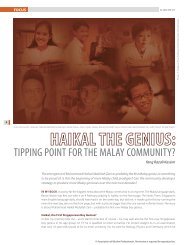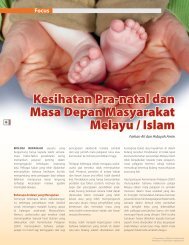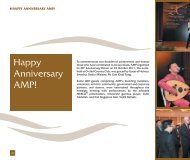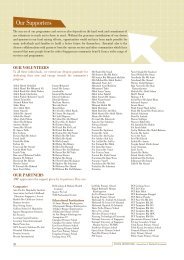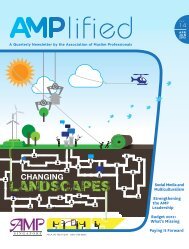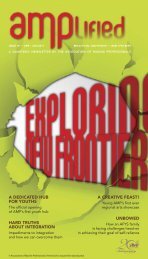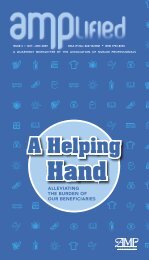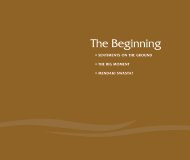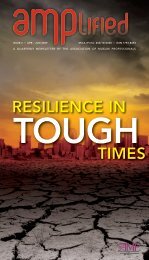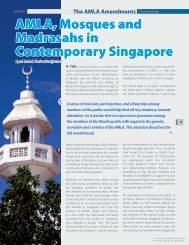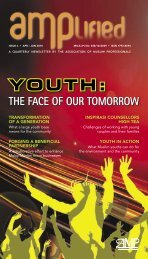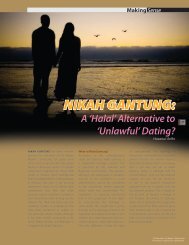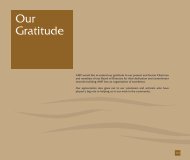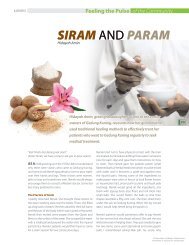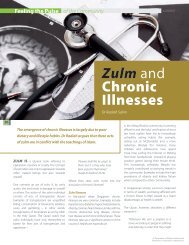The AMLA Amendments - Association of Muslim Professionals
The AMLA Amendments - Association of Muslim Professionals
The AMLA Amendments - Association of Muslim Professionals
Create successful ePaper yourself
Turn your PDF publications into a flip-book with our unique Google optimized e-Paper software.
Focus<br />
KARYAWAN<br />
Reflections<br />
on the<br />
Singapore<br />
<strong>Muslim</strong><br />
Identity<br />
Yus<strong>of</strong> Sulaiman<br />
2<br />
IN ITS 18th June 2007 issue, <strong>The</strong> Economist reported a survey<br />
by the Pew Research Centre, which found that more than 60%<br />
<strong>of</strong> <strong>Muslim</strong>s in Britain, Spain and Germany polled identified<br />
themselves by religion first before nationality. In fact, in Britain alone<br />
where multiculturalism is widely practised, 81% viewed themselves as <strong>Muslim</strong>s<br />
first. <strong>The</strong>ir response, while peculiar to their own situation, reminds us <strong>of</strong> our own<br />
experience here as <strong>Muslim</strong>s in Singapore where the tension between religious<br />
and national identities constantly tests our position as a minority community in<br />
a secular society.<br />
Our own experience is one that has evolved through time amidst the changing<br />
socio-economic and political landscape. <strong>Muslim</strong>s here continue to strive for<br />
their right <strong>of</strong> place in the Singapore social milieu. Nevertheless, pertinent issues<br />
continue to confront us: Do we see ourselves as Singaporean first or <strong>Muslim</strong> How<br />
do we respond to global events that affect fellow <strong>Muslim</strong>s in other countries and<br />
how do we live life to the fullest as <strong>Muslim</strong>s and citizens in a secular state<br />
Singaporean <strong>Muslim</strong>s have made good progress in all aspects <strong>of</strong> development<br />
in Singapore, although there are pockets <strong>of</strong> relatively lower achievement in<br />
areas such as education, social welfare and the economy. We have leaders both<br />
in government and civil society, our institutions such as our mosques have<br />
become integral parts <strong>of</strong> the Singapore national landscape and our community is<br />
increasingly involved in nation-building. To some extent we have successfully put<br />
Islam into practice in the context <strong>of</strong> the secular society that we live in. Why then is<br />
the Singapore <strong>Muslim</strong> Identity important<br />
‘For a <strong>Muslim</strong> in<br />
Singapore, his identity<br />
gives him the anchor or<br />
foundation to relate to<br />
what is truly Islamic both<br />
in faith and practice and<br />
encourages a healthy<br />
association with <strong>Muslim</strong>s<br />
elsewhere while deeply<br />
rooted to the ethos <strong>of</strong> the<br />
Singaporean society.’<br />
<strong>The</strong> Islamic Religious Council <strong>of</strong> Singapore (MUIS) embarked on the ambitious<br />
SMI project when it <strong>of</strong>ficially launched the 10 Desired Attributes <strong>of</strong> Singapore<br />
© <strong>Association</strong> <strong>of</strong> <strong>Muslim</strong> Pr<strong>of</strong>essionals<br />
Permission is required for reproduction.



